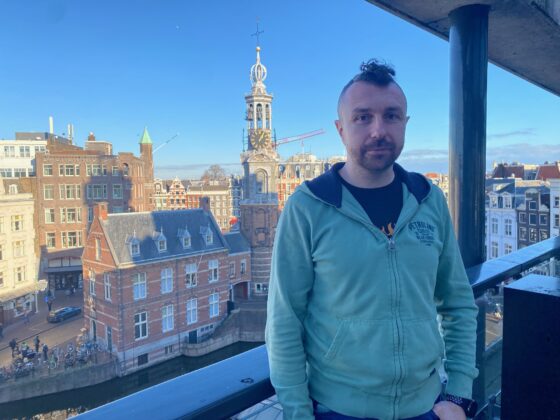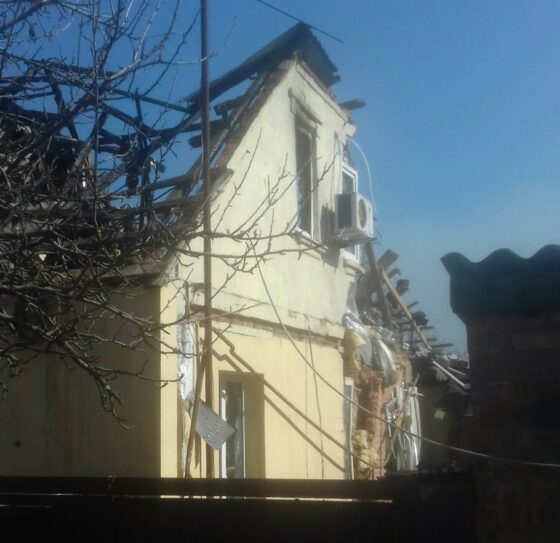The night before Christmas: Andrii Degeler on 10 months of war

 When I first spoke to tech journalist Andrii Degeler, it was February 24, 2022, and the Ukrainian-born Dutch resident was on an overnight train from the west of the country to his hometown of Kharkiv to retrieve a document he needed to get his mother to the Netherlands.
When I first spoke to tech journalist Andrii Degeler, it was February 24, 2022, and the Ukrainian-born Dutch resident was on an overnight train from the west of the country to his hometown of Kharkiv to retrieve a document he needed to get his mother to the Netherlands.
The Russian military began its attack on Ukraine before dawn, while Andrii was on that train. He managed to get the document and eventually move his mother further west from the eastern front, which was the scene of heavy attacks.
He spent a month in the Ukrainian city of Khmelnytskyi before being allowed to take his infirmed mother to the Netherlands to join his wife and son. He shared his experiences reporting on the conflict from Ukraine with Dutchnews.nl in March.
Now, 10 months after the war began and as Ukrainians mark their first Christmas since the Russian invasion, Andrii looks back at a memorable year—both the good and the bad.
Q: We last spoke 10 months ago, as the war broke out. What’s happened to you since then?
‘It’s been quite a year. After I got back from Ukraine in March, our entire family—including all our in-laws—was together. We moved from Groningen to Amsterdam. I found a new job as head of media at The Next Web. My wife also found a new job. We have a new child, a daughter! So, within the family, everything has changed. But we’re all together here in the Netherlands now.’
Q: Could you ever have imagined there’d be an all-out war in Ukraine?
‘Absolutely not. I remember while I was still there, we’d always discuss what was going on and everyone said it would just last a few weeks. I also thought it would never last long. Then I come back to the Netherlands in March. Then it’s April and May and then the summer is gone. It’s not something that we could have imagined, and right now, I’m not that optimistic. It doesn’t really seem there’s a big chance of the war ending quickly. Not anymore.’
Q: You loved your city. What’s Kharkiv like now?
‘A lot of damage was done to city centre and at least one residential neighbourhood. And then there is some damage here and there. Most landmarks are still standing, but some buildings in the centre were heavily damaged, including the municipal building. People don’t know what will happen to these buildings, no one knows how structurally sound they are. So, the city will change after the war ends. After everything is rebuilt, Kharkiv will most definitely look different.
‘The problem with Kharkiv is that it’s really close to the border with Russia, about 30 kilometres. So whereas other cities further away from the border can only be targeted with cruise missiles, Kharkiv can be targeted with just artillery, meaning it’s much easier for Russian forces to keep shelling it without spending expensive cruise missiles.
Kharkiv has been suffering throughout the war, and there were very serious fights in the area. In the end, Ukrainian armed forces took back control, but it doesn’t mean there isn’t any shelling anymore. There are people living there, but it’s still not a safe place and there is weekly shelling, if not daily.’
Q: How do you feel seeing your city destroyed from afar?
‘I have not lived in Kharkiv since 2007. I was born there, spent 20-something years of my life there. So, I’ve been watching from afar for a very long time. Right now, if there was no war, I’d be preparing to go home for the holidays to see family, show the place to our children. This is obviously not happening.
‘It’s not easy to watch these things. I know I will never live there again. I knew that before the war. But now, I also know that a lot of places I’ve known for so many years—buildings, entire neighbourhoods—don’t exist the way they used to. It’s a hard thing to contemplate. It’s just going to change, one way or the other.’
Q: Do you still have friends living there?
‘Many of our friends have moved out of Kharkiv to different parts of Ukraine or out of the country. But many of our friends are still there fighting with the military—some conscripted, some enlisted—or volunteering to help people on the front line. One of our good friends was killed a couple months ago in the trenches around Kharkiv.
And more people I’ve known over the years have also been killed in action, which I’ve yet to fully come to terms with. I feel sadness and grief, but part of me still doesn’t believe I’ll never see these people again. Those who remain let friends know they’re okay or if they need something.’

Q: Via Telegram? You’ve said before that’s a popular app for information in Ukraine.
‘Unlike in the Netherlands, in Ukraine, a lot of this stuff happens on Facebook. It’s very popular. Facebook there serves the function that Twitter does in the Netherlands or the US. A lot of people on Facebook are not talking about their family photos. Government officials are also very active on Facebook. And people my age [37] and younger are quite active on it as well. So that’s how I get a lot of my information.’
Q: Would you want to volunteer or fight?
‘No. If I had, I would have done it when I was still in Ukraine. But I’m not someone who would be useful fighting on the front line. My duty at this point is mostly to my family, who I need to support and who I will support.’
Q: And when you see images of your home as a war zone?
‘It is incredible. It’s not something that I would ever have imagined we’d see in our lifetime.
Q: Do you agree with charges that Russia is weaponising the weather?
‘Yes, absolutely. I think this was the entire idea from the very beginning. They’re trying to drive people out, to make sure the cities are uninhabitable. Which I must say is absolutely not working at the moment.
Because as an answer, many people are making a point of staying in Ukraine and using all the means they can think of to keep warm, to keep the electricity on, keep the internet on, to actually keep working as well. A lot of people are still working in between air raid sirens and blackouts. So, I think spirits are quite high.
‘Usually, people work from home when they have electricity. If they don’t, there are a whole bunch of co-working spaces in Kyiv and elsewhere. In Ukraine now there is an entire network of special points organized for people to get warmth and electricity. People can go to different places—schools, offices, everywhere—and get warm, get some electricity, charge their devices, sit for a bit. It’s to give people basic services.’
Q: How long can people’s resolve last?
‘This is the first all-out war that Ukraine has seen in a long time, but it’s not the first time Ukraine has been attacked from its northern side. I think historically, Ukrainians have proven to be very resourceful and basically with a spirit that can outlast the number of Russian missiles. And again, the winter will end. And as winter ends, it will get easier for people to persevere in this situation, which will only bring more resolve to keep going.
Q: What makes you saddest about the situation?
‘It probably has to do with the fact that I’m a young father. When I think of all the people with young kids who have to stay in the country right now, this is really what makes me almost cry sometimes. When I think how hard it is for the kids and the parents to keep going.’
Q: Is it a bit of a bittersweet holiday season? On the one hand you have a new child and a new life in Amsterdam. But the war still rages in Ukraine….
‘It is strange. Life is going on here and I come home to a young child and an older one who I love so much. But at the same time, you cannot just not think about what is going on in the country where you were born and raised.’
Q: Will your mother return to Ukraine?
‘No, I don’t think so. I will try to find a way for her to stay with us. There is nothing really left for her there. The roof of her house burned down after a Russian shell exploded next to it this spring, so she doesn’t have a house anymore and most of our relatives aren’t there.
It doesn’t make any sense for her to go back. We’ve had this conversation with her, and she agrees. It is sad for her. That’s where she spent most of her life, that’s where her parents and my father are buried. But she is not getting younger [62] or healthier, and she really needs support, and we can only provide it if she’s next to us.
Q: How long do you think this war will last?
‘I can’t predict that anymore! First, we all thought there would be no war at all! My hope would be that it doesn’t last longer than next winter. The second winter probably would be very tough. My big hope is that it’s over before then.’
Q: What do you think a future Ukraine will look like?
‘I think the society is actually becoming way healthier. We don’t know what will happen after the war ends. But right now, you can see that this entire war—the invasion, fighting, suffering—is bringing out the best in people. People are doing everything to help the next person. You could see that before the war, but it’s much more pronounced now. That will help its development after the war ends.
‘Ukraine is already a European country with a very pro-European population, but I expect that to go even faster than I would have thought two years ago. I’m sure a future Ukraine will be a very European country technically, but also by its feel and by the way society functions and by what people expect from the authorities, the rest of society and the rest of the world.’
Q: What do you hope for your children?
‘I hope they never have to live in a country at war.’
Q: Ten months ago, you said: ‘I really hope for the best, and I really hope we can all survive this and see this whole thing end.’ Now how do you feel?
‘Now I really hope that we not just survive this, but we win. That we don’t just see it end, but we see it end on our terms.’
Thank you for donating to DutchNews.nl.
We could not provide the Dutch News service, and keep it free of charge, without the generous support of our readers. Your donations allow us to report on issues you tell us matter, and provide you with a summary of the most important Dutch news each day.
Make a donation